New CENTCOM Commander Calls Iran Most Destabilizing Force In MidEast
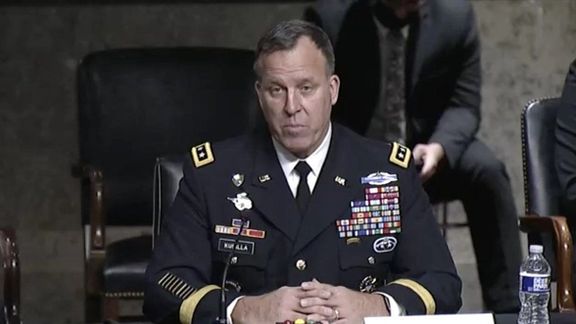
The new CENTCOM commander calls Iran the most destabilizing force in the Middle East, reiterating the position that the United States will not allow a nuclear Iran.

The new CENTCOM commander calls Iran the most destabilizing force in the Middle East, reiterating the position that the United States will not allow a nuclear Iran.
General Erik Kurilla, who was on a tour of Saudi Arabia and Egypt as part of what he called a “listening tour”, told Al Arabiya on Thursday that countering the threat posed by Iran needs regional cooperation.
“I view Iran as the most destabilizing force in the Middle East. The United States’ position is that we will not allow a nuclear Iran. However, our concerns about Iran go beyond its nuclear capability,” the top US military general for the Middle East said.
Describing Iran’s ballistic missile program and its support for proxies and Iran-backed militias in the region as other concerns for the US, Kurilla said, “The Iranian threat requires a firm effort from us and our security partners in the region... CENTCOM is committed to that effort.”
About Iran-backed Houthi attacks on Saudi Arabia and the United Arab Emirates, with the support of weapons being smuggled in, he said, “We are concerned about the smuggling of advanced conventional munitions by sea to support Houthi operations. Therefore, anti-smuggling operations with the Royal Saudi Naval Forces will serve as an area of focus for me”.
His predecessor General Kenneth F. McKenzie said during his farewell visit before stepping down that the Islamic Republic is the region’s “principal bad actor” and “biggest threat to security”.
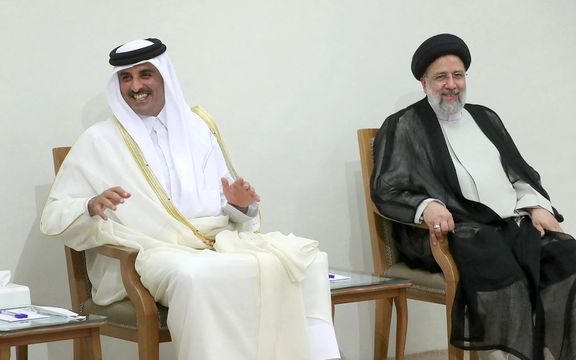
Sheikh Tamim bin Hamad Al Thani, the Emir of Qatar, who arrived in Tehran Thursday met with Iran's Supreme Leader Ali Khamenei and President Ebrahim Raisi.
An informed source told Reuters on Sunday that the Emir would focus on how to “bridge the gap” in the talk aimed at restoring the 2015 nuclear deal, Joint Comprehensive Plan of Action (JCPOA) which have been in limbo since mid-March.
The Qatari Emir's visit coincided with the presence of EU coordinator of the nuclear talks, Enrique Mora, in Tehran.
Most of Iran's official and semi-official media on Thursday downplayed or completely excluded any mention of possible mediation in the nuclear talks by the Emir and instead focused on reporting the Iranian leader and president's remarks about regional issues and Israel.
However, in a commentary Wednesday, the IRGC-linked Fars news agencydrew attention to the Qatari Emir's and Mora's visits coinciding and also mentioned the visit of a second European official, Polish Foreign Minister Zbigniew Rau, to Tehran this week.
"Sheikh Tamim wants to play the role of a mediator between the Islamic Republic and the United States, a role previously entrusted to the Omani king … Russians have also lost the position of mediation between Iran and the United States in the Vienna [talks] after the Ukraine war," Fars wrote. "There is evidence that the common factor in the three visits is energy," Fars also said, surmising that this was because Europe is now after Iranian and Qatari gas to replace supplies from Russia.
Iran made a last-minute demand, when all sides said technical matters have been resolved and a deal was imminent, for the removal of the Revolutionary Guards (IRGC) from the list of Foreign Terrorist Organizations (FTO) to which the US has not consented.
During his meeting with the Emir, Khamenei emphasized that regional problems can be solved through dialogue among regional countries without any interference of “foreign players.”
“The issues of Yemen and Syria can also be solved through dialogue," he said, adding that "dialogue should not be undertaken from a weak position at a time that the opposite parties, mostly America and others, rely on military and financial power.”
Apparently referring to normalization of relations between Israel and regional Arab countries, Khamenei said regional countries should boost relations with each other as much as possible, because Israel "foments corruption wherever it goes".
In the case of what he called Israeli attacks on the Palestinian neighborhood of Sheikh Jarrah in Jerusalem, Khamenei alleged, some Arab countries had offered even less support to Palestinians than some European countries. "Even now, they are still acting like that.”
Arab countries must know that the Israeli regime in not in a strong position to be feared or be relied on, he claimed. The Qatari Emir also condemned the attacks in the meeting and said all regional countries must confront Israeli crimes.
The joint press conference of the Iranian President and the Qatari Emir was also largely focused on regional issues, the Palestine-Israel issue, and the recent killing of an Al Jazeera reporter in Jenin by Israeli forces.
“The existing problems in the region must be settled through constructive dialogue,” Sheikh Tamim told reporters, adding that Tehran and Doha had also discussed the ongoing situation in Palestine, Syria, Yemen and Iraq.
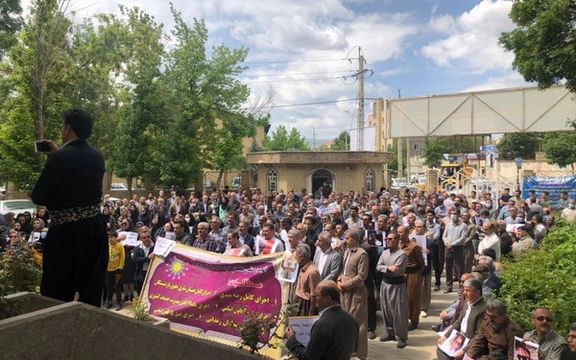
As teachers protested across Iran amid government allegations of foreign influence in their campaign, France Thursday condemned the arrest of two French citizens.
France’s Ministry for Europe and Foreign Affairs told Iran International in a communiqué Thursday it had summoned the Iranian charge d'affaires in Paris after Iran detained two French nationals on charges that they fomented teachers’ demonstrations. The ministry said the ambassador in Tehran had requested consular access to the detainees.
The Iranian Intelligence Ministry claimed Wednesday that the two had met with members of the Coordination Council of Iranian Teachers’ Trade Associations, which has organized nation-wide teachers’ protests since last year. Iran International Wednesday named those arrested as Cécile Kohler, head of the biggest federation of French teachers' unions, and her husband.
The couple arrived in Tehran's Imam Khomeini Airport April 29, stayed in Tehran for two days, and then went to Kashan and Esfahan. They were due to return home May 8, the day of their arrest. An intelligence ministry statement said Wednesday that the two went to Iranwith the aim of changing “popular” demand into “chaos, social disorder and destabilization of society.”
On Thursday, Iranian teachers took to streets for the third time in under two months despite the education ministry’s threat to fire them. According to videos posted to social media, teachers demanded better working conditions and the release of colleagues arrested in previous protests.
‘Reckless and cowardly’
The Coordination Council of Iranian Teachers’ Trade Associations said later in the day said that several people had been arrested after security forces used force to disperse the protesters in some cities, including Ahvaz, Khuzestan province, which Wednesday saw protests over increased food prices.
In a resolution published at the end of the Thursday’s rallies, protesting teachers condemned a "reckless and cowardly” attempt to attribute “decades” of their protests to foreign hands. In Tehran, police cordoned off streets leading to parliament, where teachers had gathered in previous protests.
The protests and the arrest of French nationals occurred as Enrique Mora, the senior European Union official chairing talks to revive the 2015 Iran nuclear deal (the JCPOA, Joint Comprehensive Plan of Action), was in Tehran in an effort to restart the stalled negotiations. Republican Senator James Risch, a JCPOA opponent, said Wednesday that Iran’s detention of European nationals while Mora was in Tehran “should be the final nail in the coffin for any bad deal with Iran”.
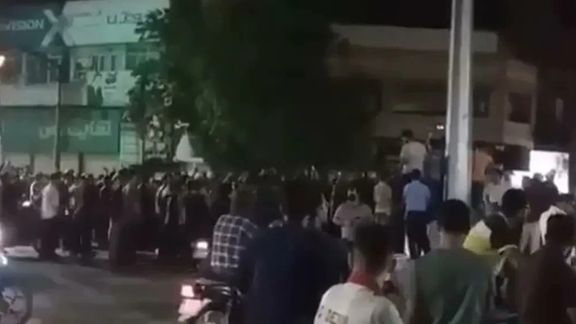
People took to the streets in several cities in southwest Iran Wednesday evening to protest a massive hike in food prices and chanted anti-government slogans.
The largest protests appear to have occurred in Dezful and there are claims on social media that people had also taken to the streets in the provincial capital Ahvaz, Izeh, and at the port city of Mahshahr.
Khuzestan Province where the protests took place is where Iran's oil fields and production are concentrated.
There are few videos of the protests amid government’s disruption of Internet access, but some videos include the narrator's statement of the date, Wednesday, and place which confirm the social media reports about protests in Dezful. In these videos protesters chant against President Ebrahim Raisi, Supreme Leader Ali Khamenei and the hike in prices.
Protesters also chanted slogans in support of the last Iranian royal family. “God bless your soul, Reza Shah,” they shouted for the founder of the Pahlavi dynasty. “King of Iran, return to Iran,” was another call aimed at the core of the Islamic Republic.
Khuzestan has been the scene of widespread protests in the past few years. Protests over water shortage in July 2021lasted for over a week during which at least eight protesters were shot dead by security forces.
A conservative lawmaker from Khuzestan, Qasem Saedi, on Wednesday warned that rising prices could trigger unrest worse than nationwide protests that rocked Iran in 2018 and 2019.
The cash-strapped government of hardliner President Raisi announced last week that it would stop paying cheap dollar for flour imports which immediately affected the price of bread and pasta. On Thursday a hike in the prices of chicken, cooking oil, and dairy products by two to threefold was also announced. Meanwhile, the Iranian rial broke the politically sensitive 300,000 threshold to the US dollar on Wednesday. It rapidly climbed to 306,000 on Thursday. Forty-five years ago, before the 1979 revolution, 70 rials bought one US dollar.
The government says it will compensate for the rise in prices of basic foodstuffs by paying cash to 90 percent of the population for the time-being, but many believe this will cause further inflation, which already stands above 40 percent.
Minister of Cooperatives, Labor, and Social Welfare Hojjat Abdolmaleki on Thursday said payment of cash will stop within a couple of months, but ration cards will be issued for lower cost food. Rationing foodstuff has been unprecedented since the Iran-Iraq War (1980-1988).
Iran's authorities often shut down or drastically slow down the Internet to prevent protesters from communicating and spreading images and videos of the protests on social media. In November 2019, NetBlocks reported a major disruption of the Internet amid nationwide protests over an increase in fuel prices.
Wednesday evening Internet access of at least one mobile carrier was completely shut down and others were seriously slowed down at the national level.
Social media users had reported disruptions in their connections in the restive province since Thursday last week in areas affected by protests over bread prices.
The international Internet freedom watchdog NetBlocks confirmed Wednesday evening that real-time network data had shown a brief collapse in international connectivity on Internet provider Rightel, as well as a deterioration on other mobile and fixed-line providers.
According to official figures published in August 2021, 94 percent of Iranians have access to mobile Internet while only around 11 percent use broadband. Authorities often reduce connection quality and speed, mainly in mobile Internet, to prevent sharing of videos and photos of protests.
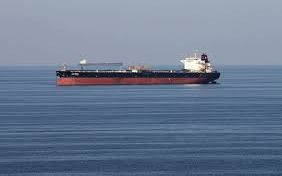
Communications of about 1,200 Israeli military personnel were examined and 10 officials were interrogated over a leak about Israeli strikes on Iranian ships.
At the time it was revealed that since 2019 Israel had targeted at least 12 vessels headed to Syria that were mostly carrying Iranian oil.
"Following this, a security investigation was immediately opened to locate the source of the leak and whether it originated in the IDF," the Jerusalem Post quoted the Israeli Defense Forces spokesperson as saying on Wednesday.
The spokesperson added that "About a year ago, it was reported that information about a military operation in an enemy state had been leaked to foreign media before the operation was carried out."
The IDF stated that no indications of the source of the leak were found during the security investigation, adding that only about 450 of over 1,200 personnel, who were exposed to the secrets about the operations, had signed a confidentiality agreement.
Moreover, the Mossad said that an unknown amount of other people from other agencies and organizations had also been exposed to the information.
For over a decade Israel has carried out attacks on the Iranian atomic program including killing scientist and drone strikes. Israel has also acknowledged that it has conducted hundreds of attacks against forces under Iranian command in Syria to prevent the Islamic Republic from accumulating weapons and entrenching itself further in the war-torn country.
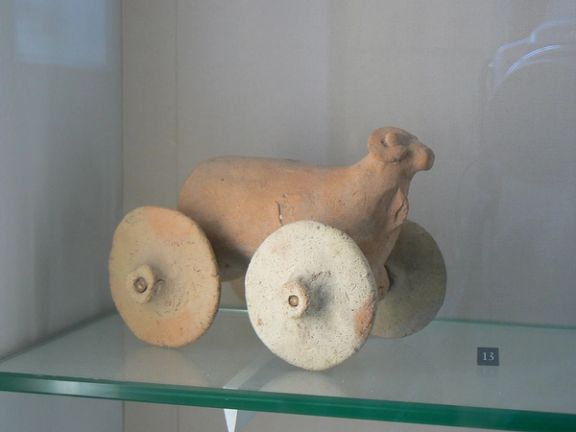
Iranian archeologists object to a plan in parliament to legalize private archeological excavation and trade in ancient artifacts and antiques.
In an open letter to Parliament Speaker Mohammad-Bagher Ghalibaf Wednesday, sixty-one archeology professors expressed deep concern over a motion, entitled "Optimum Use of Ancient Artifacts and Treasures", and demanded it to be shelved.
The motion has not officially been presented on the parliament floor yet but a copy of it has circulated in the media.
Archeologists said the planned was prepared without any consultations with expert organizations such as the Research Institute of Cultural Heritage and Tourism, the Society of Iranian Archeologists, or the Archeology Taskforce of the Ministry of Science and is in contradiction to several existing laws which regulate archeological excavation and trade in items of historical value.
The proposal also reinforces public perceptions that Islamic Republic officials are corrupt and take advantage of national wealth to enrich themselves.
The 46 lawmakers behind the motion, argue that legalizing trade in historical artifacts which will stop illegal trade and smuggling, could help Iran turn into a "regional hub of trade," and bring hard currency income to the country.
In their letter, archeologists strongly objected to selling the historical wealth of the country to procure income. Privatizing excavation and legalizing trade will also deprive the country's own museums, which will not be able to compete with private buyers, and deprive then of any future findings, they said.
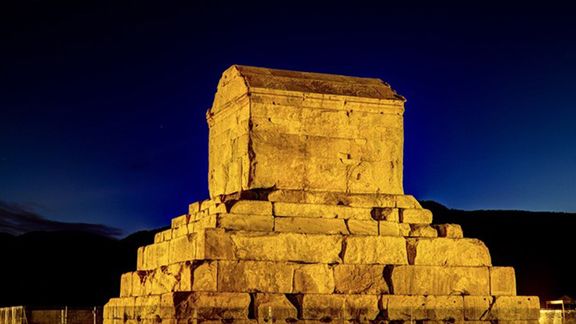
Moreover, approval of the motion could result in inexperienced excavators damaging archeological sites and their contents as well as lack of proper reporting of information related to the excavation sites and other related information which are of great significance to historians and archeologists.
Iran has numerous prehistoric and ancient sites many of which are still unexplored. Some of these sites, such as the paleolithic Ghogha Golan in the foothills of the Zagros mountains in the west of the country date back to as far back as 10,000 years.
Massive collections of ancient Persian artifacts excavated by foreign archeologists before the twentieth century adorn many top museums in the world such as the Louvre in Paris, the British Museum in London, the University of Chicago's Oriental Institute Museum, and the State Hermitage Museum in Saint Petersburg, Russia.
Hamid Baghaei, Chief of the Cultural Heritage Organization and a close confidante of former President Mahmoud Ahmadinejad in 2010 sought to legalize trade in historical artifacts and antiques and establish an international exchange on Kish Island in the Persian Gulf. The plan raised much objection and was eventually discarded.
On Wednesday, Hossein Jalali, one of the lawmakers who put his signature on the motion, told Entekhab news website that he has realized that critics are right, and the motion is faulty. One of the provisions in the proposed law may result in numerous excavations and the removal of excavated artifacts from the country, he said.
According to current laws, excavation for historical artifacts and transferring them outside Iranian borders without approval of the authorities are illegal and punishable by cash fines and prison. Any accidental findings, during construction for instance, must be handed over to the Cultural Heritage Organization.
Although trade in ancient artifacts is illegal, many such items find their way to markets including online platforms. A year ago, the cultural heritage organization prevented the sale of an ancient drinking vessel (rhyton) on Divar, an online auction and shopping platform in Iran similar to eBay but many other artifacts of various historical age and value are still traded on online platforms.